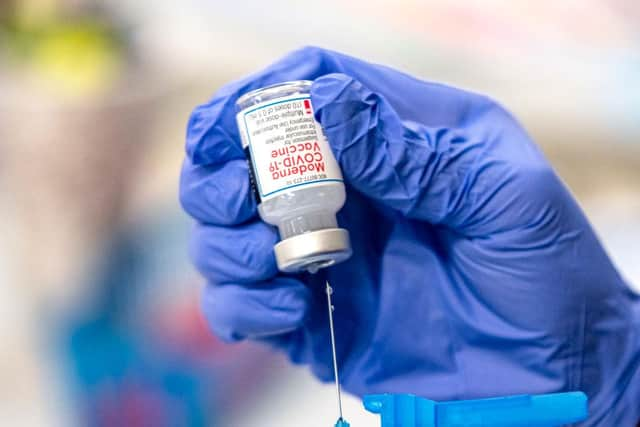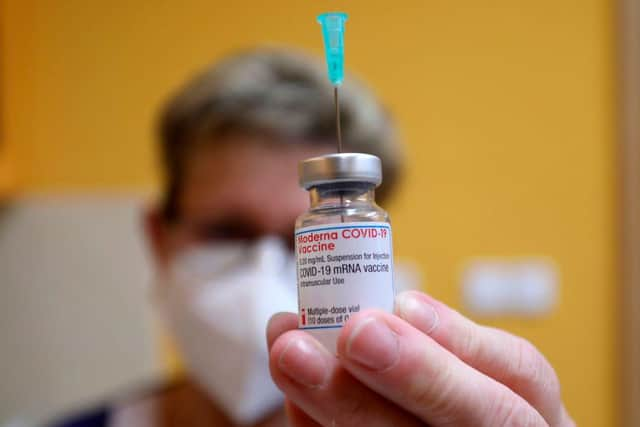Moderna vaccine: efficacy of the new Covid jab explained - and how many doses the UK has ordered
and live on Freeview channel 276
The Moderna vaccine is the third vaccine to be approved for use in the UK, and from Wednesday (7 March) it will officially roll out in Wales, with England, Scotland and Northern Ireland to follow.
As the UK prepares to roll out the new vaccine, this is everything that we know about it - from how effective it is at fighting against Covid-19 to the science behind how it works.
How effective is the Moderna vaccine?


Advertisement
Hide AdAdvertisement
Hide AdThe phase three results of the Modern vaccine trials suggested that the vaccine efficacy against Covid-19 was 94.1 per cent, and the vaccine efficacy against severe Covid-19 was 100 per cent.
The trial consisted of more than 30,000 people in the US, from a wide range of age groups and ethnicities.
Two doses were administered 28 days apart so that researchers could evaluate the safety of the vaccine, and monitor any reactions.
Moderna also released data relating to severe cases, which showed that all 30 severe cases occurred in the placebo group, and none in the group that had received the vaccine.


What about against variants?
Advertisement
Hide AdAdvertisement
Hide AdAt the end of January, Moderna said that its jab was effective against both the strain first found in the south east of England and the mutation that first emerged in South Africa.
Modern explained that laboratory tests found no significant impact on antibodies against the UK variant relative to prior variants, and while there was a six fold reduction in neutralising antibodies product against the South African variant, the levels remained above those that are expected to be protective.
How does the vaccine work?
Similarly to the Pfizer vaccine, the Moderna jab is a messenger RNA (mRNA) vaccine.
MRNAs use the virus’s genetic code, unlike conventional vaccines which are produced using weakened forms of the virus, which means that the Moderna vaccine does not contain the virus.
Advertisement
Hide AdAdvertisement
Hide AdWhen an mRNA vaccine is injected into the body, it enters the cells and tells those cells to create antigens - these antigens are then recognised by the immune system and gets it prepared to fight against the coronavirus.
Because no actual virus is needed in order to create an mRNA vaccine, it means that the rate at which it can be produced is accelerated.
How is the Moderna vaccine administered?
Like the other vaccines currently being administered in the UK, the Moderna vaccine also requires two jabs to complete the course of vaccination.
It is recommended that the second dose occur 28 days after the first dose.
Advertisement
Hide AdAdvertisement
Hide AdThe doctor, pharmacist or nurse will inject the vaccine into a muscle in your upper arm, and during and after each injection, you will be watched for around 15 minutes to monitor for any signs of an allergic reaction.
Are there any possible side effects of the vaccine?
As is standard for essentially all medicines and vaccines, there are some potential side effects that could occur after your injection.
The Government explains that “most side effects go away within a few days of appearing”.
Some of the more common side effects include headaches, muscle pain, feeling tired, chills and fever.
How many Moderna vaccines has the UK purchased?
Advertisement
Hide AdAdvertisement
Hide AdThe UK government has bought 17 million doses, which is enough to vaccinate around 8.5 million people, since each person requires two doses.
By comparison, the UK ordered 40 million doses of the Pfizer/BioNTech vaccine, which is enough to vaccinate 20 million people, as again, each vaccine requires two doses.
100 million doses of Oxford/AstraZeneca vaccine was also ordered.
Other vaccines in the works, but not yet in the advanced stages of testing, include the Novavax vaccine, the Valneva vaccine, the GSK/Sanofi Pasteur vaccine, and the Janssen vaccine.
Is the Moderna vaccine safe?
Advertisement
Hide AdAdvertisement
Hide AdModerna, which is the name of the US company behind the jab, has said that it had not found any serious safety concerns and that the vaccine is generally well tolerated.
When will the Moderna vaccine be available for use?
Welsh residents will be the first to receive the Moderna vaccine, with the first doses to be administered from Wednesday (7 March) at the West Wales General Hospital in Carmarthen.
In England, the rollout will begin “as soon as possible this month”, according to a spokesperson for the Department of Health and Social Care.
Scottish First Minister Nicola Sturgeon has said that the first batch of Moderna vaccines had arrived in the country on Monday (5 March), and that the vaccine will be delivered over the coming months.
As it stands, it’s only Northern Ireland that is yet to confirm when the vaccine will be rolled out.